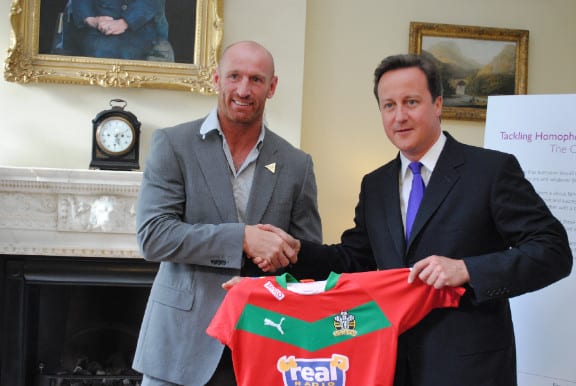│ By Harry Walker, Gale Ambassador at the University of Birmingham │
Today the Rugby World Cup comes to a close, and it’s fair to say it’s been a somewhat turbulent journey. Controversial refereeing decisions, shock defeats, unlikely Japanese heroes, the smell of lager at nine in the morning and, of course, that devastating typhoon. Within this thrilling pandemonium, a constant has been the high standard of rugby that always seems to justify that 3pm hangover. Off the pitch, a less noticeable but equally heroic constant has been the dignity with which ITV pundit Gareth Thomas has conducted himself, despite his shock revelation prior to the tournament.
Just a week before he was set to appear on our television screens on an almost daily basis, in an act of tremendous bravery, Thomas announced to the media that he was HIV positive. Thomas displayed similar courage in 2009, announcing his homosexuality to the world. Newspaper articles praising Thomas’ bravery are (pleasingly) numerous, so in this blog I wanted to do something a little bit different. Using Gale’s brilliant Archives of Sexuality and Gender, I will be trying to understand the culture of homophobia in rugby prior to Thomas’ coming out, as well as the effect his revelation has had on this culture.
Primary sources from Archives of Sexuality & Gender
Archives of Sexuality and Gender contains over three million pages of content on issues of gender and queerness across a variety of media, ranging from articles in gay newspapers to files documenting militant feminist and gay activist groups. It is therefore a great way for any student or academic to place a particular narrative within a wider context of sexuality and gender. In this case I hope it will reveal the true extent of Thomas’ heroism.
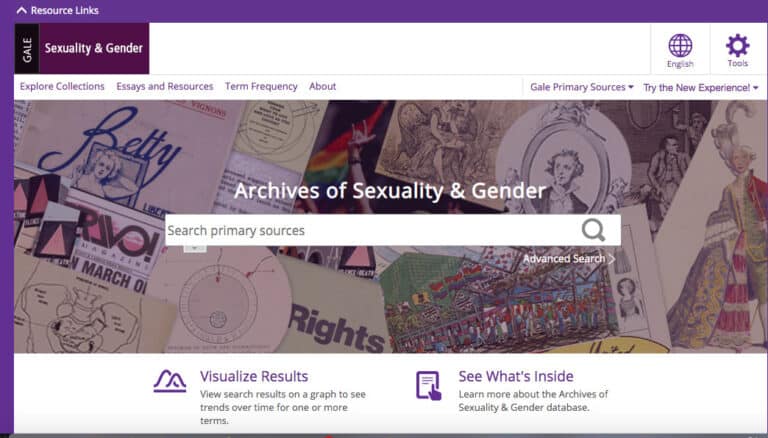
A history of institutional homophobia in rugby
Gale’s sexuality and gender archive stretches back to 1940. Regrettably, one only has to go back as far as the 1980s to find evidence of institutional homophobia in the rugby world. An article from Scottish publication Gay Scotland in 1984 details the Rugby Council’s decision to deny gay people the right to work for them. The article reports that the Conservative Leader of the Rugby Council, Gordon Collet, suggested “they could not have men arriving at work in earrings and skirts” – his lazy stereotypes revealing his uninformed bigotry. Collet goes on to highlight the absence of homosexuality in rugby, stating “he’d never met a homosexual”.
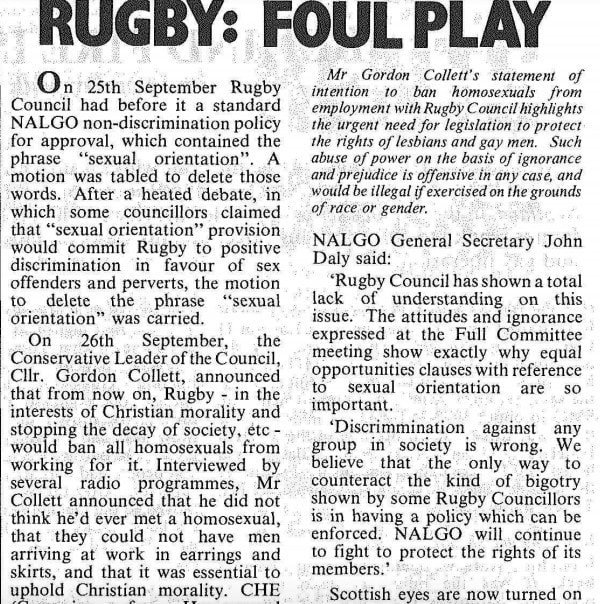
http://tinyurl.gale.com/tinyurl/ByHgL6
Discrimination prevalent at grassroots level
Sadly, as you might expect, this culture of homophobia was not limited to the boardroom. An article from 1989 in gay newspaper, Capital Gay reveals that this type of discrimination was prevalent at grassroots level as well. During a concert at the Portsmouth Polytechnic Lesbian and Gay awareness week, it is reported that “four rugby (student) protestors wore T-shirts saying: Get back in your closet or we’ll kick your fucking head in”. What seems unsettling here is that whilst others had seemed to move on, rugby seemed intent on holding on to a hateful past.
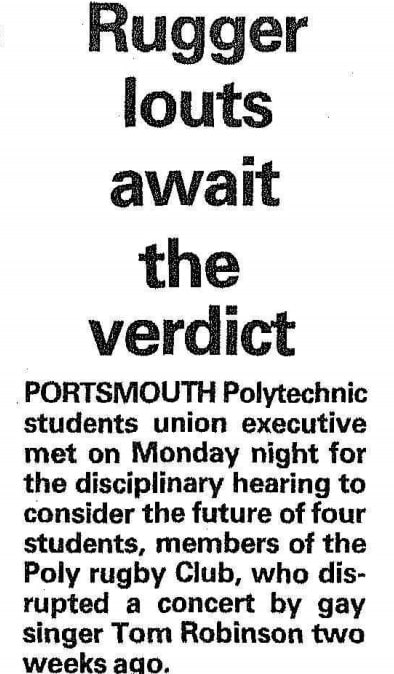
“Rugger Louts Await the Verdict.” Capital Gay, 17 Mar. 1989, p. 14. Archives of Sexuality & Gender, http://tinyurl.gale.com/tinyurl/ByHyC0
Growing up in this culture (he was born in 1974), Gareth Thomas’ life was a paradox. He loved a sport that hated him. An article from The Observer from 2015, also found in Gale’s Archives of Gender and Sexuality, quotes Thomas saying that (prior to coming out) he “lived in fear of being found out”, with his secret driving him “to the point of suicide”.
The first openly gay rugby player in the world
Despite this hateful culture, in 2009 Thomas mustered the courage to come out, becoming the first openly gay rugby player in the world. Ten years later he would announce his contraction of HIV, a disease most prevalent (in many countries) within the gay community. In both instances Thomas has received mainly praise and support, after countless years fearing abuse and ridicule. Much of this will have undoubtedly been down to Thomas’ unquestionable rugby credentials, having gained 100 international caps and captaining both Wales and the British and Irish Lions. When a legend of the game breaks these taboos it has the effect of normalising them. It helps eradicate the bigoted legacy of the past through respect and admiration. Thomas has even inspired other players to demonstrate similar courage. In that same article from The Observer, an anonymous current player reveals that “when the time is right, he will have no qualms about the idea of talking publicly about his sexuality in the same way as Gareth Thomas”.
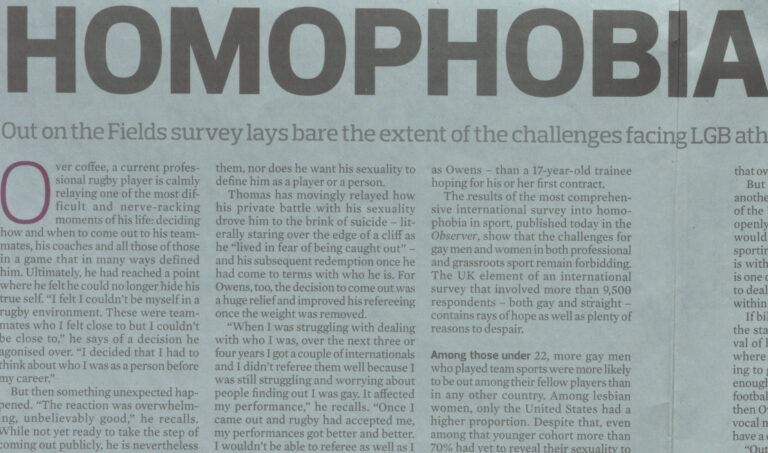
http://tinyurl.gale.com/tinyurl/BvwwS9
Thomas remains a symbol of bravery, as we have seen on our TV screens over the course of this World Cup. Always seen with a smile on his face, his consistent wit and sharp analysis do not belie a man struggling with a disease as stigmatised as HIV. Through his rugby expertise and resilient spirit, Thomas is helping to reduce the taboo around this disease associated with homosexuality, proving to the rugby community yet again that gay is OK.
Blog post cover image citation: Rugby player Gareth Thomas (left) with David Cameron at an LGTB reception at No.10 to launch a new campaign to kick homophobia and transphobia out of sport. 21 June 2011. https://commons.wikimedia.org/wiki/File:David_Cameron_and_Gareth_Thomas.jpg ukhomeoffice [CC BY 2.0 (https://creativecommons.org/licenses/by/2.0)]

